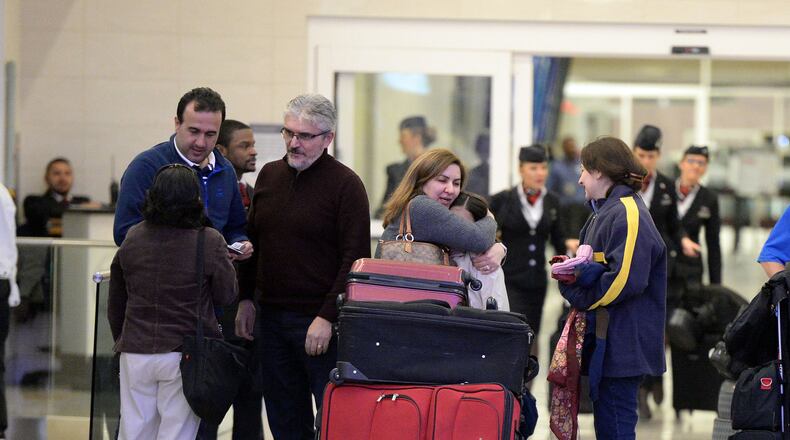A federal judge temporarily blocked part of President Donald Trump’s executive order on immigration late Saturday night following a chaotic day in which foreign travelers from predominantly Muslim countries were detained at Atlanta’s Hartsfield Jackson International Airport and the nation’s other ports of entry.
In Atlanta 11 travelers were held for hours as they returned to Georgia. Atlanta Mayor Kasim Reed said Saturday night they had all been released. Many had been visiting relatives in Iran and were snared by the order Trump signed Friday night barring all refugees and citizens of seven Muslim countries from entering the country.
Late Saturday, a federal judge in Brooklyn stayed the deportations of travelers with valid visas who were detained at airports across the country following President Donald Trump’s executive order on immigration. U.S. District Court Judge Ann Donnelly ruled that the risk of injury was too great to send them to their home countries. But she stopped short of letting them enter the U.S., and did not decide on the order’s constitutionality, according to news reports.
The American Civil Liberties Union, which filed the lawsuit, estimates the stay will affect 100 to 200 people detained at U.S. airports or in transit, but government lawyers could not confirm the figure, the Associated Press reported.
Widespread confusion surrounded the Trump mandate Saturday as authorities scrambled to make sense of who to admit and who should be denied entry.
In Atlanta, those released from Hartsfield included a woman from Alpharetta as well as a father, mother and 10-year-old daughter from Suwanee. The family was greeted with hugs by anxious relatives gathered in the arrivals area of the international terminal.
The scene Saturday at Hartsfield - the world's busiest airport - was also playing out across the country, igniting outrage among refugee and immigrant advocates, who warned that the order threatens to strand legal U.S. residents from their homes, keep families apart, and throw the futures of foreign students and workers into question. They complained they received no direction from the Trump administration on what the edict meant for impacted foreigners, and were angered that legal U.S. residents were being stopped from entering.
“This is just a nightmare for families, and a nightmare for American business,” said Atlanta immigration attorney Charles Kuck, former president of the American Immigration Lawyers Association.
Still, others cheered the move praising Trump on social media for following through on a campaign pledge to enact “extreme vetting” of foreigners into the country.
Trump’s order also compounds the suffering of refugee families who have waited for years to be united with their loved ones, said J.D. McCrary, executive director of the Atlanta office for the International Rescue Committee, which planned to resettle the 40 refugees after their arrival.
“Choosing to slam America’s door on refugees is a betrayal of who we are as a nation and will be particularly devastating to those mothers, fathers, children and grandparents who have spent years apart and were scheduled to be reunited this week,” McCrary said. “The heartbreak they are experiencing today is deeply concerning to all of us as humanitarians.”
The refugees were already on their way from Afghanistan, Democratic Republic of the Congo, Myanmar, and Somalia when the executive order was signed Friday afternoon, said McCrary. They are scheduled to arrive in Atlanta on Monday.
“The question is, what’s going to happen to all the people who are already in the air, all of the people who are on the first or second leg [of their journeys]?” McCrary said. “We haven’t heard anything about that.”
Trump’s executive order suspends all refugees from entering the U.S. for 120 days, and bars those from war-torn Syria indefinitely. It also blocks entry to citizens from seven predominantly Muslim nations for 90 days.
In Atlanta, a small throng of advocates and lawyers in the international terminal were joined by U.S. Reps. John Lewis and Hank Johnson. At first the Democrats were denied information from Customs and Border Patrol officials.
Credit: KENT D. JOHNSON / AJC
Credit: KENT D. JOHNSON / AJC
“Why don’t we just sit down and stay a while,” Lewis said.
Johnson said the officers were “winging it.”
“As far as we can tell there are no written protocols that have been issued to the U.S. Customs and Border Protection officers,” Johnson said. “So they are kind of winging it, like we are winging it. And it puts them at a disadvantage because, of course, they have a job to do to keep us safe under normal conditions.”
Mansour Kenareh of Suwanee said his brother-in-law’s family was held for four hours by U.S. Customs and Border Protection officials at the airport.
“They went back to visit their parents and siblings and now they come back and are facing this new overnight ruling,” Kenareh said as he waited for his relatives in the international terminal.
“There is a big difference between a visa – which means permission to enter – and permanent residence, which gives the right to live in this country,” he continued. “Right now, the authorities are completely confused… I’m very concerned about the response I’m getting.”
Nabee Mosavi of Alpharetta said his mother-in-law – a certified public accountant – was detained for about an hour.
“She got her green card back in 2011,” Mosavi said as he waited along with Kenareh.
“I have no idea what the reason is to hold her,” he continued. “This is not right for green card-holders.”
The relatives declined to name the detainees because they worried that doing so would cause more trouble.
Sarah Owings, an immigration attorney, worked for the release of the travellers.
“These are people who live here — who have houses, dogs, cars,” Owings said. “We are being stonewalled. We are not being given any information beyond the number and email address for the public affairs officer” from U.S. Customs and Border Protection.
Immigration lawyers have been bracing for Trump’s executive order for days, warning their clients to cancel overseas travel plans or return immediately to the U.S. avoid being stranded overseas. But for some, it’s an impossible choice. One of Kuck’s clients risked being stranded overseas to visit his ailing mother.
“There was no other choice,” Kuck said. “She’s sick.”
Opponents of the executive order are mobilizing against it. A protest is being planned for Sunday afternoon at the airport's international terminal.
And the Council on American-Islamic Relations is is planning to challenge the order’s constitutionality, said Edward Ahmed Mitchell, the executive director for the Georgia chapter of the civil rights group.
“We’re not going to sit around and take it. We’re going to exercise our civil rights,” Mitchell said. “Trump might be president, but he’s not the emperor. There are limits to what he can do.”
Keep Reading
The Latest
Featured





